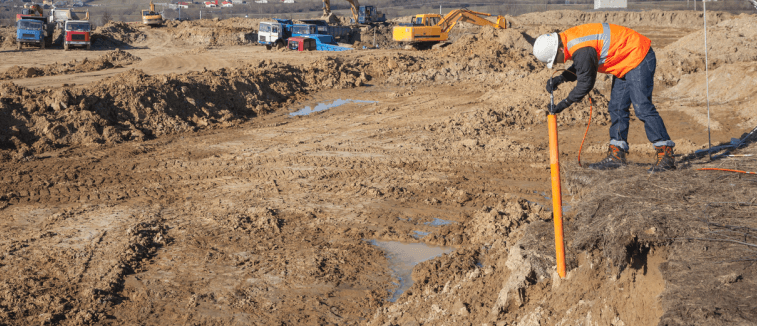Top Geotechnical Engineers for Cutting-Edge Dirt Analysis and Structure Design
Wiki Article
The Interdisciplinary Approaches in the Geotechnical Market: Connecting the Space Between Engineering, Geology, and Environmental Science for Ideal Job Results
The combination of design, geology, and ecological science within the geotechnical market is not just beneficial; it is necessary for accomplishing ideal job results. What methods might arise to promote this crucial collaboration and improve the effectiveness of geotechnical practices?Relevance of Interdisciplinary Collaboration
The significance of interdisciplinary cooperation in the geotechnical sector can not be overemphasized. Reliable geotechnical jobs need the combination of varied proficiency from different fields, including design, geology, and environmental scientific research. This cooperation makes certain that all elements of a job are thought about, bring about comprehensive services that attend to complex difficulties.Interdisciplinary collaboration cultivates advancement by making it possible for professionals to share insights and techniques that may not appear when working in seclusion (tailings engineer). By leveraging the strengths of multiple techniques, groups can recognize prospective risks, optimize layout processes, and boost the sustainability of geotechnical tasks. Such partnership promotes a holistic understanding of site-specific conditions, which is crucial for precise analysis and decision-making.
The intricacy of geotechnical jobs necessitates a coordinated approach to analytical. Ultimately, interdisciplinary partnership is crucial for progressing finest methods and attaining excellence in the geotechnical industry.
Trick Roles of Each Discipline
Cooperation amongst various self-controls is not just useful; it is vital for the successful implementation of geotechnical projects. Each self-control-- engineering, geology, and ecological scientific research-- plays a distinct yet interconnected role that adds to predict efficiency and sustainability.Geotechnical engineers are largely liable for developing foundations and making certain structural integrity. They assess dirt and rock homes to assess load-bearing capabilities, offering crucial data for safe building practices. Their expertise allows the formula of cutting-edge services to complex obstacles.

Ecological scientists evaluate the possible influences of construction on ecological communities and water resources. They conduct environmental evaluations and create mitigation techniques to decrease negative effects. By incorporating environmental factors to consider, they make sure compliance with regulations and promote sustainability throughout the task lifecycle.
Case Studies of Successful Assimilation
Successful assimilation of geotechnical self-controls can be exemplified through different study that highlight the performance of team effort in resolving complex engineering difficulties. One remarkable example is the building and construction of the Hong Kong-- Zhuhai-- Macau Bridge, where a collective strategy entailing geotechnical design, geology, and environmental science was important. Rock hounds and engineers functioned in unison to analyze the seabed problems and enhance the structure layout, guaranteeing security and reducing environmental effect.Another impactful situation is the renovation of slope stability in the San Francisco Bay Location, where an interdisciplinary group integrated geotechnical evaluation with environmental assessments. By integrating hydrological researches and geological surveys, the group properly identified prospective landslide dangers and executed efficient reduction procedures, improving safety and sustainability.
In addition, the redevelopment of Brownfield websites typically needs a multidisciplinary strategy. In one instance in Chicago, partnership among geotechnical engineers, environmental researchers, and urban planners caused the effective removal of contaminated soil, enabling for the secure makeover of the website right into a community park. These study show that interdisciplinary collaboration not just addresses technical obstacles however also promotes innovative remedies that profit both tasks and communities.
Obstacles in Multidisciplinary Projects

Moreover, coordinating routines and workflows amongst numerous groups can be problematic, specifically when each discipline has unique project turning points and deliverables. This imbalance can result in hold-ups and enhanced expenses. The challenge of source allowance likewise impends huge; making certain that customized know-how is readily available at vital junctures calls for cautious planning and foresight.
Last click to investigate but not least, regulative compliance presents one more significant obstacle. Each technique might deal with various governing frameworks, and straightening these demands to meet job purposes can be intricate and taxing. Addressing these difficulties requires solid leadership and effective interaction approaches to cultivate partnership and make sure that multidisciplinary groups function cohesively towards shared goals.
Future Trends in Geotechnical Practices
As the geotechnical sector advances, emerging fads are reshaping methods to resolve the difficulties encountered in multidisciplinary projects - engineer of record. One considerable trend is the increased assimilation of advanced innovations, such as expert system and artificial intelligence, right into geotechnical evaluation and style. These technologies improve anticipating modeling and risk analysis, allowing engineers to make more informed choices throughout the job lifecycle
In addition, the fostering of electronic doubles and real-time surveillance systems is becoming a lot more widespread. These tools promote continuous evaluation of soil problems and structural performance, permitting for prompt interventions when problems arise.
Final Thought
In verdict, the combination of engineering, geology, and ecological science is vital for attaining ideal results in the geotechnical market. Effective case studies highlight the benefits of this approach, while recognizing the obstacles faced in multidisciplinary jobs.have a peek at this site The combination of design, geology, find more information and environmental scientific research within the geotechnical market is not simply beneficial; it is imperative for accomplishing ideal job outcomes. Reliable geotechnical jobs need the assimilation of diverse competence from various fields, including engineering, geology, and environmental science.Navigating the intricacies of multidisciplinary jobs in the geotechnical sector offers several considerable challenges.As the geotechnical industry develops, arising trends are reshaping practices to address the obstacles dealt with in multidisciplinary jobs. Geotechnical engineers are increasingly collaborating with ecological scientists to ensure that tasks line up with sustainability goals and comply with governing requirements.
Report this wiki page